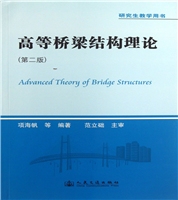




the book is the research achievement ofcombining theory with practice made by related research sections under BridgeEngineering Department of Tongji University in cultivating the postgraduatesover the last decade, including the achievements in software development and participationin specification studies. The book contains five parts: Part One—SpatialAnalysis Theory of Bridges, including thin-wall box girder, slant bridge and curvebridge and added urban spatial special bridge; Part Two—Analytical Theory forReinforced Concrete and Prestressed Concrete Bridges, including creep,shrinkage, temperature and crack control, strength and durability computation, andnew and additional 3D internal and external cabling theory, etc.; Part Three—AnalyticalTheory for Steel Bridges and Composite Beam Bridges, including stable,orthotropic deck, fatigue and differentcomposite bridge computation; Part Four—analytical theory of large-span bridge,including the computation of geometric nonlinear, stable and differentlarge-span bridges; Part Five—Analytical Theory of BridgeConstruction Control, includingcontrol principle, algorithm and construction control features of differentbridges. The last executive chapter of the book presents the developmentprospects of the bridge structure theory in the 21st century.
The book can be usedas teaching material for master postgraduate students of bridges as well asreference for the technical personnel engaged in bridge research and design.